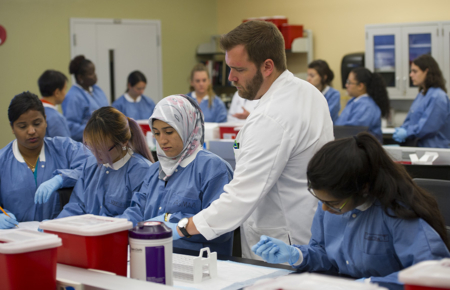Health Science Careers Program
2025-2026
Exploring Careers in Health Sciences
People considering careers in health sciences typically tend to think primarily of doctors and nurses. There is also the sonographer, the nutritionist, the cytotechnologist, the mental health counselor, and the health information manager, among dozens of other health professionals, who provide diagnostic and therapeutic services. All of these specialized and highly skilled professionals are an essential part of any health care team.
To encourage high school students to investigate specialties in the health field, Rutgers School of Health Professions (SHP) has partnered with New Jersey high schools to offer exploratory programs in health sciences and health care for sophomores, juniors and seniors. At the same time, they can earn up to 15 college credits.
The program familiarizes students with the abundance of careers in health fields, and it serves as a pathway to meet New Jersey’s need for professionals in the fast-growing health professions. According to the United States Department of Labor, employment in health care is projected to grow 8.6 percent from 2023 to 2033 due to an aging population and increased access to health insurance. Heath care is expected to add more jobs than any other group of occupations.
Contact your high school to see if it offers Careers in Health Sciences in partnership with Rutgers School of Health Professions.
High School Program
 The program is part of the regular high school day. Students take college‐level, introductory healthcare, and science courses, and earn credit by examination. Students in the program gain a solid foundation in the health sciences and their experience with college level course work enhances academic skill development.
The program is part of the regular high school day. Students take college‐level, introductory healthcare, and science courses, and earn credit by examination. Students in the program gain a solid foundation in the health sciences and their experience with college level course work enhances academic skill development.
Only high schools with an approved Memorandum of Understanding (MOU) in place are qualified to participate in the Health Science Careers Program. Exam registration is only through the Rutgers School of Health Professions Health Science Careers (HSC) Program Application.
For more information on initiating a Health Science Careers program at your high school, high school administrators should contact Vaishali Singhal @ singhava@shp.rutgers.edu
The mission of the HSC program is to introduce high school students to various healthcare professions through a core curriculum emphasizing science, the human and organizational side of health care, and the opportunity to earn college credit by examination.
- Promote the concept of the health care team as essential to patient well‐being;
- Provide students with a strong foundation in science, and the health care system;
- Enhance quality high school-to-college articulation
- Create pathways into health science programs offered at Rutgers SHP
Curriculum
The curriculum provides the students with the opportunity to earn up to 15 college credits.
The high schools follow syllabi for each course that includes topical outlines, assignments, and activities provided by Rutgers SHP faculty. The high school faculty must have at least a master’s degree and/or a health professional degree. Each high school instructor is evaluated individually to determine qualifications.
Credit by Examination
Online comprehensive exams for each course are offered at the end of the Winter/Spring of semester. College credit cannot be obtained without taking the course exam.
Health Science Careers Program Grading System
All students must attain an examination grade of C(73) or better to earn college credits. Note: the SHP grading scale will be changing in AY 26-27. We will be eliminating minus grades.
No grades are higher than 100% (i.e. no extra credit above 100%). When calculating the final grade that appears on the Rutgers transcript the below grading system applies. Keep in mind the Rutgers, SHP numerical equivalent may not be the same as your school.
| A | 93.0-100 | 4.0 |
| A- | 90.0-92.9 | 3.7 |
| B+ | 87.0-89.9 | 3.3 |
| B | 83.0-86.9 | 3.0 |
| B- | 80-82.9 | 2.7 |
| C+ | 77.0-79.9 | 2.3 |
| C | 73.0-76.9 | 2.0 |
| C- | 70.0-72.9 | 1.7 |
| D+ | 67.0-69.9 | 1.3 |
| D | 63.0-66.9 | 1.0 |
